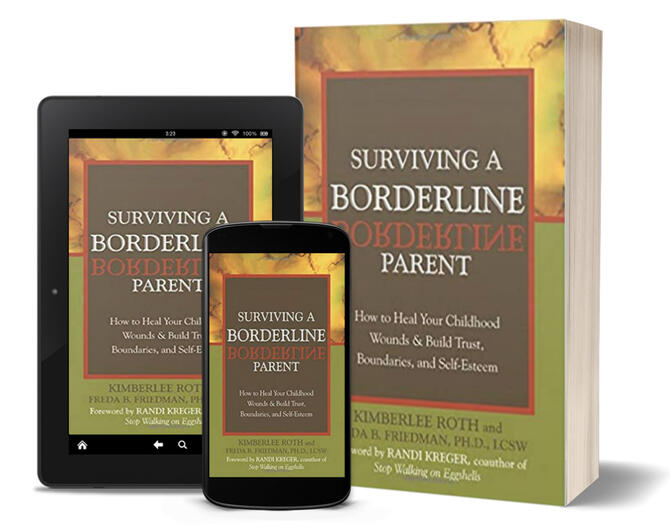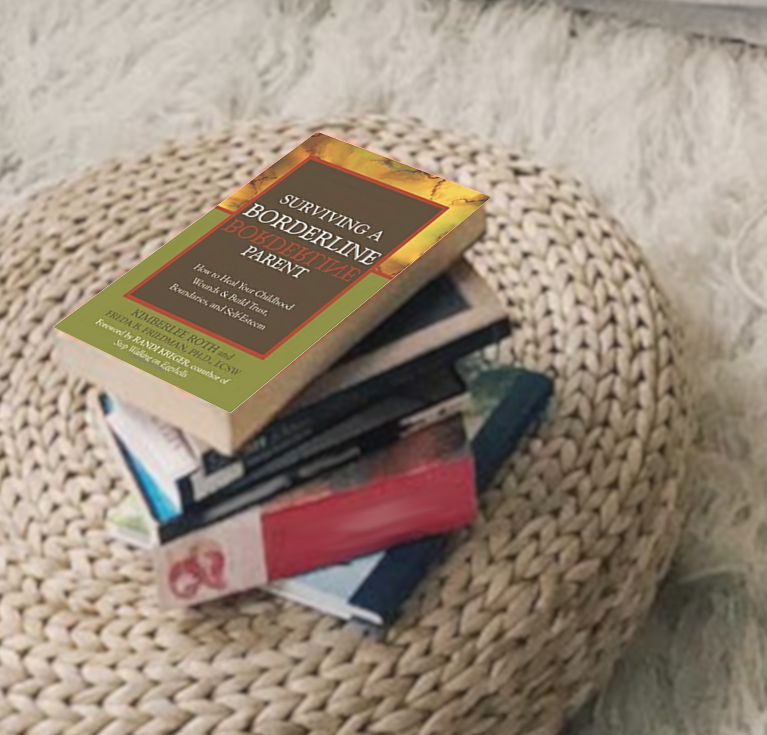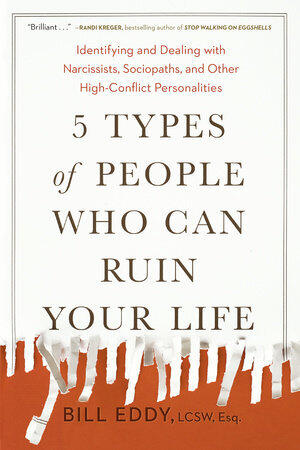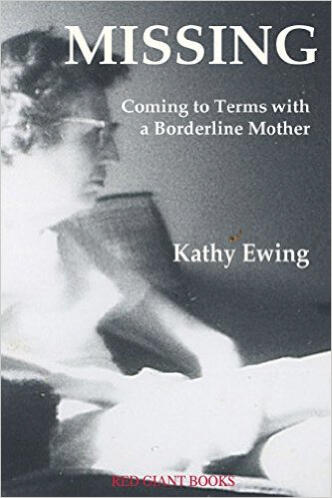Surviving a Borderline Parent
How to heal childhood wounds and build trust, boundaries, & self esteem
A step-by-step guide for adult children raised by a parent with the traits of borderline personality disorder (BPD).
If you were raised by a borderline mother or borderline father, your childhood likely was influenced by• inconsistency
• volatility and rejection
• unrealistic expectations
• conflict, fear, control, and guiltYour parent may, at times, seemed emotionally immature, narcissistic, or self-absorbed. At other times, loving, nurturing, and caring.The ups and downs may have led you to wonder what was "wrong" with you or to feel “crazy.”The effects may still impact your adult life and your relationships today.Want to learn more? Read an excerpt.
12 ways this book can help
Surviving A Borderline Parent is really about two main things: Understanding what you went through as a child and overcoming the issues that hold you back now.
If you think you were raised by a borderline parent, diagnosed or not, this book can help you1. Learn more about BPD and borderline traits.
2. Identify the messages children receive from parents with borderline traits.
3. Learn why you may have felt responsible for others and out of step with your peers.
4. Understand how growing up with a parent with BPD traits may have influenced the adult you—and your relationships with others.
5. Discover why you feel guilty.
6. Gain insight into why you may dread dealing with your parent now.
7. Learn how you can identify and better cope with the many emotions adult kids of parents with BPD have, including anger and grief.
8. Break free from old, habitual ways of thinking about your past, your role in the family, and who you are now.
9. Understand what healthy relationships and healthy boundaries can look like.
10. Rewrite old scripts and develop new strategies for interacting (or not!) with your parent.
11. Get inspired by ideas for taking good care of yourself.
12. Picture new possibilities for your future and…Much more.
Resources
The following resources might be of interest to adults raised by a parent with BPD traits. Make your own decisions about their usefulness, and although I try to check the links from time to time, they may expire or change.Note that clicking on any link will take you to another website and that the content, security, and privacy policies of those other sites will apply.
Neither the Surviving a Borderline Parent book nor this website is intended to help you in urgent crisis situations. If you are in danger or require assistance, contact a medical professional, therapist, or emergency services.
Books
I've compiled several lists at bookshop.org, some of which you can browse below. Bookshop.org donates 10% of purchases to independent bookstores (you get to choose which one). As an affiliate, I also receive a small percentage of purchases made through the link. You aren't charged extra in either case.Bookshop.org sells paperbacks and hardcover books and some audiobook formats, but not all audio formats and not ebooks, and they ship only in the United States. Readers who want other formats or live outside the U.S. might still want to browse the SBP lists for ideas.
Websites
Stop Walking on Eggshells
A website published by Randi Kreger, author of Stop Walking on Eggshells, the Stop Walking on Eggshells Workbook, The Essential Family Guide to Borderline Personality Disorder and others. Kreger also wrote the foreword to Surviving A Borderline Parent.High Conflict Institute
Published by therapist and lawyer Bill Eddy, who offers a number of resources, including the "It's all your fault" podcast, focused on high conflict personalities (HCPs). He describes HCPs as displaying patterns “of high-conflict behavior that increases conflict rather than reduc[es] or resolv[es] it” including:
- All-or-nothing thinking
- Unmanaged emotions
- Extreme behaviors
- Blaming others
While Bill’s work doesn’t focus specifically on BPD, it addresses key aspects of BPD, narcissism and other personality disorders, and may be helpful to adult children of parents with BPD traits. Read the Q&A interview I did with Bill here.YouTubers
Dr. Dan Fox
A psychologist who specializes in treatment of personality disorders like BPD and narcissism. One of his videos focuses on growing up with narcissistic parents.Dr. Kim Sage
A psychologist with a YouTube channel about healing from being raised by a parent with BPD or NPD.Blogs and articles (Note that some articles may be behind a paywall.)
Psychology Today blog, Narcissism Demystified, by Dan Neuharth, author of
- If You Had Controlling Parents: How to Make Peace With Your Past and Take Your Place in the World (1998)
- Secrets You Keep From Yourself: How to Stop Sabotaging Your Happiness (2004)The Debt: When terrible, abusive parents come crawling back, what do their grown children owe them? by Emily Yoffe in SlateWhen Parents are Too Toxic to Tolerate by Richard Friedman, MD in The New York TimesForgiveness Isn’t All It’s Cracked Up To Be, an NPR interview with the two authors listed above, Yoffe and FriedmanYou Carry the Cure in Your Own Heart, a powerful essay by child protection attorney, advocate and writer Andrew Vachss, published in the 1990s in Parade magazineThe Legacy of a Narcissistic Parent by Dr. Robin Berman, author of Permission to Parent: How to Raise Your Child with Love and Limits, in goopThe Legacy of Distorted Love blog by therapist Karyl McBride on PsycologyToday.com. McBride is also the author of Will I Ever Be Good Enough? Healing the Daughters of Narcissistic Mothers. (Narcissism often co-occurs with BPD.)Borderline: Walking the Line, an article by Matthew Hutson in Psychology Today addressing the question: Can you live with, and move beyond, a relationship with a borderline parent?
Readers often comment on the relief and validation they feel when they learn their childhood experience with a borderline parent had a reason, a name, and that many others have had similar experiences, too.* Understand and overcome the lingering effects of being raised by someone with BPD behaviors.* Discover specific coping strategies for issues common to children of borderline parents: low self-esteem, lack of trust, guilt, and others.* Begin to find a path forward, toward reclaiming your self and living your own, full lifeWant to learn more? Read an excerpt.
About the Authors
Kimberlee Roth is a professional writer who has written about Borderline Personality Disorder and topics related to relationships and physical and emotional wellbeing for numerous websites, magazines and newspapers, including the Chicago Tribune.Freda Friedman, Ph.D., LCSW, is in private practice and a member of the Phoenix Institute in Chicago, Illinois. For the past twenty years, her primary clinical focus has been with Borderline Personality Disorder, providing treatment, education, support and consultation to people suffering from the disorder, their families and health care professionals working with them. She is on the board of several professional health care organizations and has developed BPD programs in New York and Chicago.Want to learn more? Read an excerpt.
Contact
Please be aware that our time is limited and we may not be able to respond personally to your message.We also cannot respond to requests for advice about individual situations.Thank you.If you have an urgent matter, contact your doctor, therapist, or emergency services in your country (for example, 911 in many parts of the United States).
© 2023. All rights reserved.
Privacy policy
Thank you
Please be aware that we may not be able to respond personally to your message.We also cannot respond to requests for advice about individual situations.If you have an urgent matter, contact your doctor, therapist, or emergency services in your country (for example, 911 in the United States).
Excerpt
Reprinted with permission of the publisher from Surviving A Borderline Parent: How to Heal Your Childhood Wounds & Build Trust, Boundaries, and Self-Esteem by Kimberlee Roth and Freda B. Friedman, PhD, LCSWIntroductionAs a child, did you feel like you fell short, disappointing a parent, stepparent, or caretaker because you weren’t good enough, didn’t do enough, or just weren’t able to please, no matter how hard you tried? Did you feel responsible for your parent’s happiness and guilty if you felt happy yourself? Did you feel damned if you did and damned if you didn’t, that whatever you did or said was the wrong thing (and boy would you pay for it)? Were you accused of things you hadn’t done? Did you feel manipulated at times? Feel appreciated one minute and attacked the next? Thought you must be “crazy” because a parent’s actions or reactions didn’t make any sense? Question your own intuition, judgment, or memory, believing you must have missed or misinterpreted something? Did you feel on guard all the time, that life with your parent was never predictable?You weren’t crazy. Not then, and not now, though it may still feel that way. What felt crazy-making to you may well have been being parented by someone who had traits of borderline personality disorder.Though relatively common, borderline personality disorder is often overlooked or misdiagnosed by therapists and clinicians and denied by those who suffer from it. It’s a confusing, complex disorder that’s extremely difficult for all involved: for the person with BPD, for the clinicians trying to understand and help their client, and perhaps most of all, for the children who have to endure its unpredictable effects.No one chooses their parents and, as young children, once you’re brought into this world, you’re not in a position to opt out of your relationship with them. In fact, you desperately need them—to provide food and shelter, to prompt you to learn, to model ways to interact in society, to nurture you, to show you affection, and to provide unconditional love. A parent with BPD, however, may not have been able to consistently provide all of these things to you, through no fault or deficit of yours. They may not have received that kind of care themselves. It may seem ironic, but your parent may actually have consciously or unconsciously reinforced you as the caretaker to meet his or her needs, to be the nurturer and provider of emotional support, even though you were a young child.Does This Sound Familiar?Which of the following match your experience with a parent or other caretaker growing up?- Your parent teased you, often cruelly, about physical attributes, mental abilities, intelligence, habits, or other personal characteristics.- You remember sequences of events and conversations differently from your parent.- Your parent confided in you, perhaps with inappropriate details, and expected you to keep his secret or to side with her.- You were treated like a little adult instead of a child, expected to consistently assume responsibilities parents should, such as emotionally comforting or reassuring your parent, frequently cooking, cleaning, caring for siblings, and other responsibilities.- Your feelings were discounted, denied, criticized, or ignored.- You weren’t permitted to express strong emotions, particularly anger.- You didn’t receive much physical or emotional affection— hugs, kisses, or being told you were loved.- You were held to extremely high, often unattainable standards, and those standards shifted so you had a hard time knowing what was expected of you.- You were given mixed messages about your appearance or your behavior.- You weren’t encouraged to explore, experiment, or develop your own opinions.- Your privacy and/or your belongings weren’t respected.While you were growing up, did you feelscared?confused?angry?guilty?responsible?far older than your age and your peers?listless?invisible?unlovable?Now as an adult, do you- find yourself in abusive, unfulfilling, or unhealthy relationships?- feel unable to trust others and let your guard down?- expect the worst from others—family, friends, and strangers?- feel responsible for others’ moods, feelings, and actions?- put others’ needs ahead of your own?- have a hard time knowing what you want?- tend not to trust your own feelings and reactions?- feel uneasy with success or have difficulty simply enjoying life?- get highly anxious in social settings or new situations?- fear taking risks, especially where relationships are concerned?- hold yourself to standards nearing perfection?- feel worthless, hopeless, or depressed?If you relate to many of these experiences, chances are you may have been raised by a parent with BPD or BPD-like traits. Chances are also good that the effects are still with you, in subtle, and likely fundamental, ways. They probably have affected and continue to affect who you are, as well as your relationships with others—how you choose and who you choose to spend time with, to befriend, to partner with, to love.A New RealityThis isn’t another book focused on family dysfunction or about terrible mothers (though BPD is diagnosed in women three times as often as in men, for a variety of reasons we’ll cover shortly). It’s not about blame or wallowing either—you are all molded by so much more than a dysfunctional past, and you must ultimately take responsibility for creating the life you want. Certainly, it’s important to acknowledge and identify the effects of BPD on your life. It’s equally important to realize that it neither dictates who you are nor fixes your destiny.This book is really about just two things: understanding and change. We hope it will help validate your experience as a child of a borderline parent, help you identify the impact it had and continues to have on you, regardless of whether your parent is still alive, and that it will lead you to more positive alternatives to the negative thoughts, beliefs, feelings, and behaviors you may have learned. We also hope reading this book will help you envision—and cultivate—the you you want to be and begin to build the future you want to live. It may sound like a cliché, but it’s true: you deserve to be happy.As an adult child of someone with BPD, you’ve likely been cultivating and honing certain beliefs and behaviors since infancy. Though you may not remember, as a baby, you viscerally sensed anger, frustration, and despair through your parents’ touch, voice, and breathing rhythm; you felt tension tightening the air. Growing up in continual response to erratic and intense emotions has taught you reflexive responses, which come as instantly as your leg jerks when the doctor taps your knee with a rubber mallet or you spin around when someone calls your name. Well-and long-ingrained, what you learned may have helped you protect yourself physically, mentally, and emotionally from your borderline parent, but it’s probably not serving you well now—in fact, it may be keeping you from fully understanding and accepting yourself, and from connecting with others. The catch is, your coping mechanisms and ways of relating to your self and to others are so much a part of your emotional repertoire, you rarely stop to question them. They define your worldview, like the tint of glass lenses, and therefore dictate how you see and interact with the world.This book assumes that you’re thinking about making some positive changes in your life. It presupposes that you have an inkling that there’s more to life than what you’ve long thought, been told, or have been living with in your family of origin. It presupposes that you want to pursue that sense of possibility, frightening though it may be. Regardless of where you’re at emotionally, this book assumes potential and your willingness— and courage—to reach for it.How do you begin to take a hard look at your life, without the tint of your old lenses? How can you come to know and trust yourself and dismantle the defenses that may surround you? How do you begin to conceive of a new and better life? How do you learn to see the good in people, to feel deserving of healthy relationships and a full, rewarding life? This book will help you start to explore the many ways. You’ll make the changes you choose to make at your own pace. The rewards—though they come slowly and quietly—are great.In the past few years, there have been several excellent books written about BPD. A trip to your local library or bookstore today yields an armful of titles that weren’t available even ten years ago to both individuals with the disorder and their loved ones. There are also numerous Web sites, chat rooms, listservs and other online resources available. Other than giving some history and an overview of BPD in the first chapter, we don’t repeat work that’s already been done, but rather have tried to use all that’s come before as a springboard for further exploration.How to Use This BookIf this is the first time you’re hearing of borderline personality disorder or you’ve heard the term and want to know more, chapter 1 spells out the signs and symptoms of the disorder and explains how those behaviors can affect children.If you’re familiar with the traits and behaviors of BPD and recognize one or more of your parents, stepparents, or caretakers as having had the disorder, you may want to just scan chapter 1. Then move on to chapter 2 to see how the messages you received as a child may still be influencing you now. If you’re a partner, friend, or family member of someone whose parent has or had BPD, this book will provide insight into the experiences that shaped the person you know today.Throughout the book, we’ll use the term adult child to refer to adult children of a parent with borderline personality disorder. For ease of reading, we sometimes use the term borderline parent to refer to someone with BPD traits. The term parent may refer to stepparents, grandparents, or any other adult with primary child care responsibility.You’ll see many places throughout the book to “Stop and Think.” These exercises are designed to help you apply the concepts in the text to your own particular circumstances and experiences. You may want to use a notebook or journal to record your responses and reactions. So you can measure your progress down the road, be sure to date all of your entries.You've reached the end of the excerpt.Surviving A Borderline Parent: How to Heal Childhood Wounds and Build Trust, Boundaries, and Self-Esteem is available in ebook, paperback, large-print (paperback), and audiobook.
Bill Eddy, an author, lawyer, mediator and therapist, who specializes in dealing with high-conflict cases and high-conflict personalities, has written a new book, 5 Types of People Who Can Ruin Your Life. Bill sent me an advance review copy a few months ago, and I invited him to do this e-interview. The techniques he describes are directly relevant to interacting with someone with borderline personality disorder (BPD) and other personality disorders.SBP: For readers who may not be familiar with the term, can you explain what you mean by a high-conflict personality, or HCP?BE: Based on my observations over 20 years of dealing with legal disputes, workplace disputes, family disputes and neighbor disputes, the individuals who stayed stuck in conflict (or who increased conflicts) are those with a narrow pattern of the following four characteristics:- A Preoccupation with blaming others
- All-or-nothing thinking and solutions
- Unmanaged emotions
- Extreme behaviors (I define that as behaviors 90% of people would never do)I’ve come to call people who show those four characteristics “high conflict personalities,” or HCPs for short.SBP: Those four characteristics will probably sound familiar to readers with a borderline parent. Can you talk about the overlap between high-conflict personalities and personality disorders, such as borderline personality disorder (BPD), narcissistic personality disorder (NPD) and/or histrionic personality disorder (HPD)?BE: I’ve worked with people with personality disorders (PD) since the 1980s in psychiatric hospitals and outpatient clinics. The two key characteristics for them are: 1) truly not reflecting on their own behavior and, therefore, 2) not changing their behavior. So when an HCP and a PD overlap, when they feel emotionally threatened, hurt or wronged, they tend to focus on a target of blame. They remain stuck in blaming that person for everything and don’t look at their own part in the problem or try to change anything to make the situation better.So those HCPs with BPD, in some situations they focus all their frustration, rage and desire for revenge on a specific person and are often willing to drag them into court, publicly humiliate them by spreading rumors over the internet and possibly even use violence to break their possessions or physically harm them.Those HCPs with NPD often publicly put their targets of blame down to put themselves up. They can be insulting and demeaning, without empathy. Those HCPs with HPD may make up stories in public and spread rumors about their targets of blame, and be very dramatic about it.SBP: You’ve been working with HCPs and their targets of blame for a long time, and you’ve written several books. What prompted this particular book, and why now?BE: After 30 years as a therapist and as a lawyer and mediator, I have seen so many people trying to get out of relationships with high-conflict people, that I wanted to write a book that would warn them before they got into these relationships—romantic, at work or in general. It’s especially important now, because our culture of blame seems to be increasing and filtering down to the smallest levels of conflict. I believe that the number of high-conflict people are increasing in society, so others need to start learning the skills now to identify them, avoid intense relationships with them and deal with them effectively if they are in relationships with them—such as in their families, at work, in their communities or other settings.SBP: What’s the most common question you get about HCPs? What’s the hardest thing for others, including targets of blame, to understand about their interactions with high-conflict personalities?BE: The answer to both of these questions is the same thing. The most common question I get is “Don’t they know what they’re doing? Can’t they see the harm they’re doing to others and themselves?”And the answer is basically NO. And this is the hardest thing for targets of blame to understand. HCPs lack self-awareness and therefore don’t change, so they defend their bad behavior as “normal and necessary” for the situation.So in dealing with them, you need to forget about trying to give them insight into their own behavior, and instead focus on what to do now going into the future. If you focus on the past, you will just get stuck with them, like in quicksand, because they can be so defensive about their past behavior.Instead, it helps to use the CARS Method® that I describe in the book (and I explain below).SBP: Your background is a bit unusual – you’re both a therapist and an attorney, and you co-founded and now lead the High Conflict Institute. Can you talk about your career path and how practicing those two professions helped you learn to identify, and gain insights into, HCP thinking and behavior?BE: I got into this focus on high-conflict behavior accidently. I was working as a therapist, mostly with couples and families in which there was a substance abuse problem. I also volunteered at a community mediation center helping neighbors and others resolve their disputes. I liked how counseling-types of methods seemed to help resolve these disputes better than going to court. I especially saw how divorcing couples could benefit from divorce mediation, rather than fighting in court. So I went to law school after a dozen years as a therapist, and set up my law practice to focus on both family law in court and divorce mediation out of court.In the process of switching from therapy to law, I noticed that the cases I dealt with in mediation had the same issues as the cases that went to court: parenting plans, child support, property division, etc. But what made the difference between which family went to court and which family settled everything in mediation was the personalities of the parents – not the legal issues.Since I had a dozen years as a therapist, I recognized that the “high-conflict” families – the ones who headed to court because they couldn’t settle the issues in mediation – involved one or more parents with a personality disorder or traits. They were so stuck in their behavior, things didn’t get resolved. There was always another issue to fight about.After a few years, the high-conflict pattern became clear to me, because I saw it repeated so often in one case after another. But the other legal professionals involved (lawyers, judges, mediators) didn’t think about the personalities at first, because they didn’t have the therapy background.I started writing and teaching about this cross-over subject. Then I set up the High Conflict Institute with another colleague who also had been working in family law, Megan Hunter. That was ten years ago in 2008. It’s as relevant now as ever.SBP: What was the process like to develop the strategies and tools you share in 5 Types of People Who Can Ruin Your Life? How did you know when things were working, and when they weren’t? What signs would you see in HCPs, or hear about from your clients who were dealing with them, that “told” you you were on the right track?BE: Thirty years ago, I worked as a therapist with some clients with personality disorders in a psychiatric hospital. So when I started seeing the same personalities with traits of these disorders in legal disputes, I realized the same techniques should work with them.I began to focus a lot on trying to connect with HCPs in legal disputes like I did with patients in the psychiatric hospital: lots of empathy, attention and respect, and to avoid criticizing them and blasting them with anger and frustration — which is what I saw a lot of lawyers and judges doing.I also learned as a therapist that there would always be another crisis the personality-disordered patients wanted me to solve for them, and that I had to give back the responsibility to them to solve their own problems by giving them encouragement and helping them look at their choices for future behavior and decisions. This approach worked really well with law clients as well.Through trial and error over the last 20 years, I developed methods for legal conflict resolution based on counseling methods for personality disorders. I mostly learned by making mistakes, then learning what I could have done differently.I knew methods really worked when my clients would calm down and make more rational decisions. It’s like you can almost decide how logical or emotional the client will be by how you behave toward them. Use the CARS Method and they calm down and focus on problem-solving. Use blame and shame, and they become highly agitated and confrontational. Unfortunately, the legal system tends to reinforce the blame and shame approach, which doesn’t work very well for HCPs.SBP: If readers were to take away only one thing from your book, what would you want it to be?BE: The CARS Method®.Connect by staying calm and saying something that shows empathy, attention or respect for the person.Analyze options by focusing on the future and what choices you have or the HCP has.Respond to hostility or misinformation with straight information that is Brief, Informative, Friendly and Firm (BIFF).Set limits by focusing on rules and policies, so that you don’t make it personal.I’ve tried to make this approach simple, but it does take practice because it’s usually the opposite of what you feel like doing when you’re frustrated with a high-conflict person. But it does work to help calm situations and manage relationships.And by the way, you can use this approach with anyone; so you don’t even have to figure out if a person is a high-conflict person. If it’s even a possibility, you can still use this approach.SBP: One of the great things about your book is how you not only help readers improve their awareness of others’ personalities, but also their own, too. Handling conflict is difficult for a lot of people, but among individuals raised by a borderline mother or a borderline father, it can be especially challenging because they didn’t get to consistently practice some pretty essential conflict-resolution skills.Why did you make the decision to include that self-awareness piece in the book; what role does self-awareness play in dealing with HCPs?BE: I think self-awareness is the key to healthy and happy relationships. For people raised by a borderline parent, you got almost the opposite of this – parents who did lots of blaming others and not reflecting on him or herself.The reason this is so important is that it helps us learn and grow together in relationships. It’s such a rewarding experience when, for example, a parent can say to a child: “I hear what you’re saying and I’ll think about it.” Just those words alone reduce so much tension and open the door to an improved relationship.Self-awareness is the key to adapting to others enough to meet more of their needs and, therefore, asking them to meet more of your needs. Relationships should be an exchange, not a battleground.But it takes practice. For those who didn’t get to practice this as a child with a borderline parent, they can practice with friends, a partner or a therapist.Likewise, self-awareness is also the key to identifying healthy people versus toxic people in your life. If you meet someone and you start feeling even a little bit like you’re that person’s target of blame (they insult you, blame you, slightly hit you, start intense arguments, etc.), that would be a sign of someone to stay away from.You might feel it before you consciously recognize it. So our gut feelings can help us, but we also need to use our heads and get consultation from others. Self-awareness means openness to change, which is a good thing in all areas of our lives.SBP: Thank you, Bill! Readers, you can find Bill's book at your preferred retailer or at his website, www.HighConflictInstitute.com.
Author Kathy Ewing has written a beautiful, touching and insightful memoir, Missing: Coming to Terms with a Borderline Mother. Her book is about the impact and experience of being raised by a parent with borderline personality disorder. As I read the manuscript, I knew I had to have Kathy visit Survivingaborderlineparent.com (SBP) and answer a few questions. She generously agreed, and here is the result of our e-conversation.SBP: How did the idea to write a book, and specifically a memoir, come about for you?KE: It evolved gradually. I had learned a lot about borderline personality disorder in trying to help a friend. Then, in a sort of epiphany, I suddenly connected my mom’s oft-repeated refrain about my once being “perfect” (but then falling far short) with the black-and-white thinking associated with BPD. Almost immediately, I could connect some of my mom’s behavior with each one of the BPD symptoms. So I began writing them down, because I write partly to understand my own thinking. It was as though I was trying to prove to myself that her behavior really was consistent with BPD. My writing group had just begun about the same time, and I steeled myself to begin sharing a few of these very personal little essays with the group. They were interested and very encouraging, so I kept going. After awhile, as I tried to find books about mothers with BPD, I realized there might be a need and a market for a story like mine.SBP: You write about a gift you gave your mother that she set down on her dresser and never opened. What did that experience mean to you? What has that wrapped box come to represent?KE: That wasn’t even a “story” in my mind, until, as I describe in the book, I shared it with a friend. She and I were talking about Avon products in kind of a joking way, and suddenly that memory came to mind. I had wrapped up a little bottle of cologne for my mom’s birthday, and since she recognized the size and knew what it was, she never opened it. I began to realize that this story was weirdly symbolic of something missing in my mom, an inability to connect. One of my writing group friends remarked that this anecdote, for her, is the key to the whole book, because I myself was the gift my mother never opened. This was the first experience I had of a reader seeing more in my story than I had actually perceived myself.SBP: Now that you have some context for the confusing, sometimes heartbreakingly disappointing and hurtful childhood experiences, what would you say to your younger self? What would have been helpful for you to hear from the adults around you as you were growing up?KE: I would borrow Dan Savage’s advice for young gay people: It will get better. My mom’s neediness and anger felt smothering at times, and it took me some years to break out and breathe, but it happened. If I could have understood then that she was genuinely suffering from a mental illness, I think I would have felt less resentful. Any adult acknowledging that my mom’s behavior was odd would have changed everything for me. The few times my dad spoke up and contradicted her meant a lot.SBP: How did your childhood experience with a borderline parent influence your decision to have children, and your parenting? In what ways did your mother’s parenting serve as a positive model, and in what ways did it serve as a reminder of what you did not want to do with your own children?KE: I think I believed, a little arrogantly, perhaps, that I could do a better job than my mom. And my mom was a positive role model in some respects: she cooked a family dinner seven nights a week, she shared some laughs with my dad and with us, she tried to attend our concerts and activities, and so on. Other things were very difficult for her, and I struggled with some of these tendencies myself as a parent. She was moody and would lash out for no reason. (The writer Christine Ann Lawson, author of Understanding the Borderline Mother, calls it “The Turn.”) She made sure we knew she was unhappy most of the time and reminded us regularly that we had disappointed her. She was missing (hence, my title) too often when we needed her emotionally. I tried to do better with my own kids.SBP: Your father — you write about how he was such a tremendous presence in your life. In what ways did he help you deal with your mother’s “absence”? I recently finished a project related to helping the children when one’s partner has BPD. One of the themes that emerged over and over is how important it is for kids to have a strong and healthy bond with at least one adult. In what ways did your dad foster that kind of relationship between the two of you?KE: Questions arose as I began sharing parts of the book about how much of my dad to include, when the book is ostensibly about me and my mom. But I think what you’re saying is so important. I had a funny, smart, courageous dad who, though he wasn’t warm and fuzzy, provided a loving example to me and my sisters. Despite his physical disability (paraplegia), he was positive and involved in our lives. I describe how, for example, he once drove me to a day-long music contest and sat in the car by himself all day waiting for me. He read the books I loved and talked about them with me. He asked me questions about my friends and my life, which my mom never did. It’s so simple, really, but so significant.SBP: Can you describe, or summarize, the process you went through to understand, and free yourself from, or make peace with (in what terms do you think about it?), the effects of being raised by a parent with BPD?KE: I don’t think I’m exactly free or at peace, but I understand better what was going on with my mom and what happened to me. I’m certainly more peaceful than I was before researching and writing. I used to brood about my mom and mull over things she said to me. I’ve exorcised most of that in the writing. Trying to grasp fully that my mother couldn’t help the way she was has nudged me along. I wrote in my blog recently that it’s more healthy to assume she did the best she could than to stoke my resentment that she could have done better. I suffer residual effects still, I think. I can lapse into gloominess and feel like a martyr sometimes, but now I’m better able to see myself doing it and resist the temptations.SBP: It’s an ongoing process… Since writing and completing the manuscript, have you had any new insights into your childhood or BPD?KE: Yes, the insights are still coming. I’m starting to be able to see my mom as loving. That is, I can empathize a little bit more with her as time goes by. Our love for our children is deep and overpowering, and if you have an emotional disability that prevents you from feeling deeply, or at least from expressing deep feelings appropriately, parental love must be almost debilitating. More and more, my experience becomes very much what Mary Oliver expressed so beautifully in the poem that serves as the book’s epigraph: Someone I loved once gave me/A box full of darkness/It took me years to understand/That this, too, was a gift. Just the sharing I’ve been able to do so far, for example, with people who’ve had similar experiences has been enlightening. I’ve met people through my blog, long before the book’s publication, who’ve become valuable friends. I’ve maintained my friendship with Nancy, the woman with BPD without whom I would never have made the connection, and I learn more from her all the time. I feel in general more humble and less judgmental, though I have a long way to go.SBP: What do you most hope readers, many of whom I’m assuming will have been raised by a borderline parent, gain by reading your book?KE: If your parent with borderline personality is alive and present in your life, it can be extremely hard to be understanding and empathetic. You can hardly help being caught up in the moment. I hope readers will see that things can get better, as I said, if you’re patient both with the parent and with yourself. When your parent says something cruel and disapproving, you can think, “That’s not them. That’s the disease.” Getting help and support for yourself is key. Reading books like mine (and Surviving a Borderline Parent!) can demonstrate that you’re not alone. My sisters have been great supports. In addition, I’ve discovered a whole little community of women with mothers like mine, and we can share our experiences with empathy and also large doses of black humor. Humor helps, when you can muster it.SBP: Thank you, Kathy! Readers, you can order Missing: Coming to Terms with a Borderline Mother from your local independent bookseller or via Bookshop.org.
Privacy Policy
Here’s a summary of how we protect your privacy:Cookies
We do not use cookies or other technologies to track traffic, but our website builder and host might. You can find that privacy policy here. In addition, embedded content may use cookies. See the section on embedded content below.We do not use third-party advertising programs that might collect or share your information. Affiliate links will be identified as such, and you are free not to use them.For more information about how to control and delete cookies, you can visit www.aboutcookies.org. Most browsers also provide options for you to limit and delete cookies.LinksClicking on the links on this site will (as links do) take you to other websites. These other sites may use cookies and collect information for their own purposes. If you have questions about what other sites might do when you visit, do not click on links, and first check those sites’ cookie and privacy policies for further information.Affiliate links: Links on this website to bookshop.org are affiliate links. If you use them and a purchase at bookshop.org, I receive a percentage. You are not charged extra, and you do not have to use the link if you don't want to.Contact formIf you use the contact form on this site, you are agreeing to share your email address with us and your name if you choose to include it. We may use the email address you provide to respond to your inquiry, but we will not rent, sell or share it with third parties, except in the event of suspicious activity, as required by law or in response to a formal legal request.Embedded contentContent on survivingaborderlineparent.com may include embedded material, such as videos or bookshelves from other websites. By engaging with this content, e.g. playing a video, you are enabling those websites to potentially collect data about you, to use cookies and to accept third-party tracking, as examples, in accordance with those sites’ policies. Interacting with embedded content is just like visiting those other sites directly. If you have any questions about what these other sites might do when you engage with embedded content, do not click on links or media, and first check those sites’ cookie and privacy policies for further information.What rights you have over your dataWe do not collect or store any personal data about you, except for your email address and message if you opt to use the contact form. Many email services offer the ability to mask or anonymize your email address if you prefer to keep it private.Privacy policy updatesWe may update this privacy policy in the future. Visit this page for the current policy. By continuing to visit or browse this site, you accept the policy in effect at the time, as spelled out on this page.Contact informationShould you have questions about this policy, contact us by through the contact form on this site or email at info@survivingaborderlineparent.com.
Thank you.






